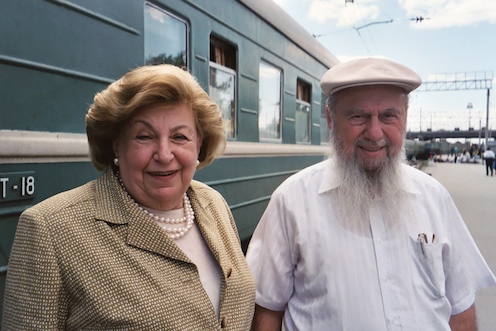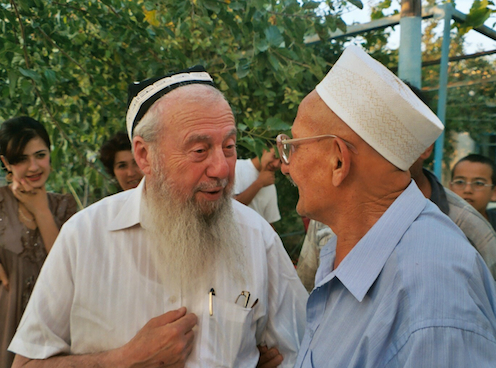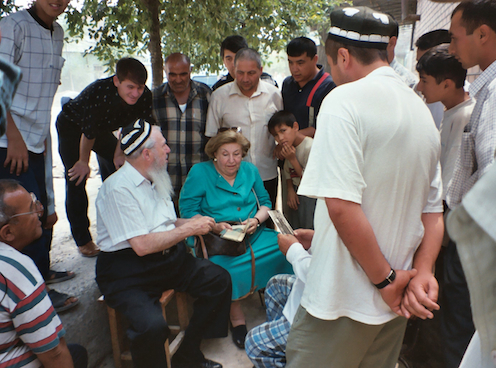Saved By Deportation: An Unknown Odyssey of Polish Jews
Full Description
Well-known fact: Of Poland’s 3.3 million Jews, only 300,000 survived the Holocaust. Little-known fact: 80 percent of those who survived did so because of being deported to Stalin’s gulags following the Soviet annexation of eastern Poland in 1939. Amazing fact: For some, this grim hardship was a gift, not only of life, but of their humanity.
“While in Russia,” says Asher Scharf, protagonist of this lively documentary, “I thought, ‘I’m going to write a book.’” About the forced marches, the hard labor, the illness and death, the bedbugs that, like the Soviets, were “more clever than we gave them credit for.” Asher recounts, “When I got back to Poland, I realized I had been in heaven.”
Saved by Deportation interviews seven articulate and philosophical individuals who, as youths, survived the war in this strange way. But only Asher and his wife Schyfa return with the filmmakers to Chelyabinsk, in southern Siberia. They go on to Uzbekistan and Tajikstan, where, in yet another historical anomaly, many of the deportees were unceremoniously dumped in 1941. There, in a largely Muslim society, they started lives, and became citizens of the world.
Saved by Deportation has wit and charm, as the camera tries to keep up with the pixie-like Asher, unstoppable at 80 years old. In him, we see the results of life given, and lived, as a gift.
Filmmaker Bio(s)
From 2008 Festival: Director, United States
Slawomir Grünberg is an Emmy Award Winning documentary producer, director, cameraman, and editor born in Lublin, Poland. He is a graduate of the Polish Film School in Lodz, where he studied cinematography and directing. He emigrated from Poland to the US in 1981, and has since directed and produced over 40 television documentaries. School Prayer: A Community at War premiered on PBS in the 1999 POV season, received a National Emmy Award, and won at many film festivals around the world. It also won The Jan Karski Competition, a competition designed to recognize and award outstanding television documentaries produced on the theme of moral courage. Another one of Slawomir’s films and funded by ITVS, Fenceline: A Company Town Divided premiered on PBS in the POV season of 2002 and received, among others, an award at the 2002 San Francisco International Film Festival and Vermont International Film Festival. This film also received a 2003 Environmental Media Association Award (EMA). The EMA Awards honor films and television productions that increase public awareness of environmental problems and inspire personal activism. Borderline: People vs. Eunice Baker received Best Documentary Award on a Theme on Disability at the Picture This…Festival in Calgary, Canada. The most recent of Grünberg’s films are two Holocaust related stories: The Legacy of Jedwabne - awarded at the Crossroads Film Festival, Lublin, Poland and Saved by Deportation - the Audience Award at the Washington Jewish Film Festival and Portraits of Emotion, a film about autism - an Expression Award at Brazil’s Disability Film Festival
In 2004, Slawomir received the DreamCatcher Award at the Hope and Dreams Film Festival. This award was to recognize his commitment to documentary filmmaking. Slawomir’s independent works focus on critical social, political, and environmental issues and have won him international recognition. Chelyabinsk: The Most Contaminated Spot on the Planet, which he produced and directed, was awarded the Grand Prix at the International Nature & Environmental Film Festival, in Grenoble, France in 1996. In 1998, another documentary that deals with environmental issues, From Chechnya to Chernobyl, was awarded a Grand Prix at the International Environmental Film Festival in Prague, Czech Republic and also received a prestigious Golden Cine Award in the US. In 1997, Shtetl, the epic film that Slawomir photographed and served as second unit producer for, was awarded the Silver Baton for Excellence in Radio/Television Journalism by Dupont-Columbia University, and also the Grand Prix at the Cinema du Reel Film Festival in Paris, France in 1996.
His director of photography credits include among others: Legacy, which received an Academy Award Nomination for the best documentary feature in 2001, and Sister Rose’s Passion, which won the Best in Documentary Short at the Tribeca Film Festival in 2004 and received an Academy Award Nomination for the best documentary short in 2005. As a principal director of photography, he has shot over 50 documentaries, four of which received Emmy Nominations. Slawomir has also been a contributing director of photography and editor for the PBS series: Frontline, AIDS Quarterly, American Masters, NOVA, Health Quarterly, Inside Gorbachev's USSR with Hedrick Smith and People's Century as well as Lifetime and HBO.
A recipient of Guggenheim, New York Foundation for the Arts (NYFA) and Soros Justice Media Fellowships, Grünberg has received multiple grants from National Endowment for the Arts (NEA), the New York Council on the Arts (NYSCA) and National Endowment for the Humanities (NEH). Documentary films by Slawomir Grünberg have been screened at various prestigious theaters, including Lincoln Center's Walter Reade Theater, the U.S. Holocaust Memorial Museum and The Museum of Modern Art in New York City and also at festivals in Iran, France, Germany, Korea, Australia, Brazil, Russia, Canada, Slovakia, Portugal, Czech Republic, Belarus, Tunisia and Poland. His films are in the permanent collections of many film societies, festivals and libraries.
Director(s)
Country(ies)
Language(s)
Release Year
Festival Year(s)
Running Time
89



